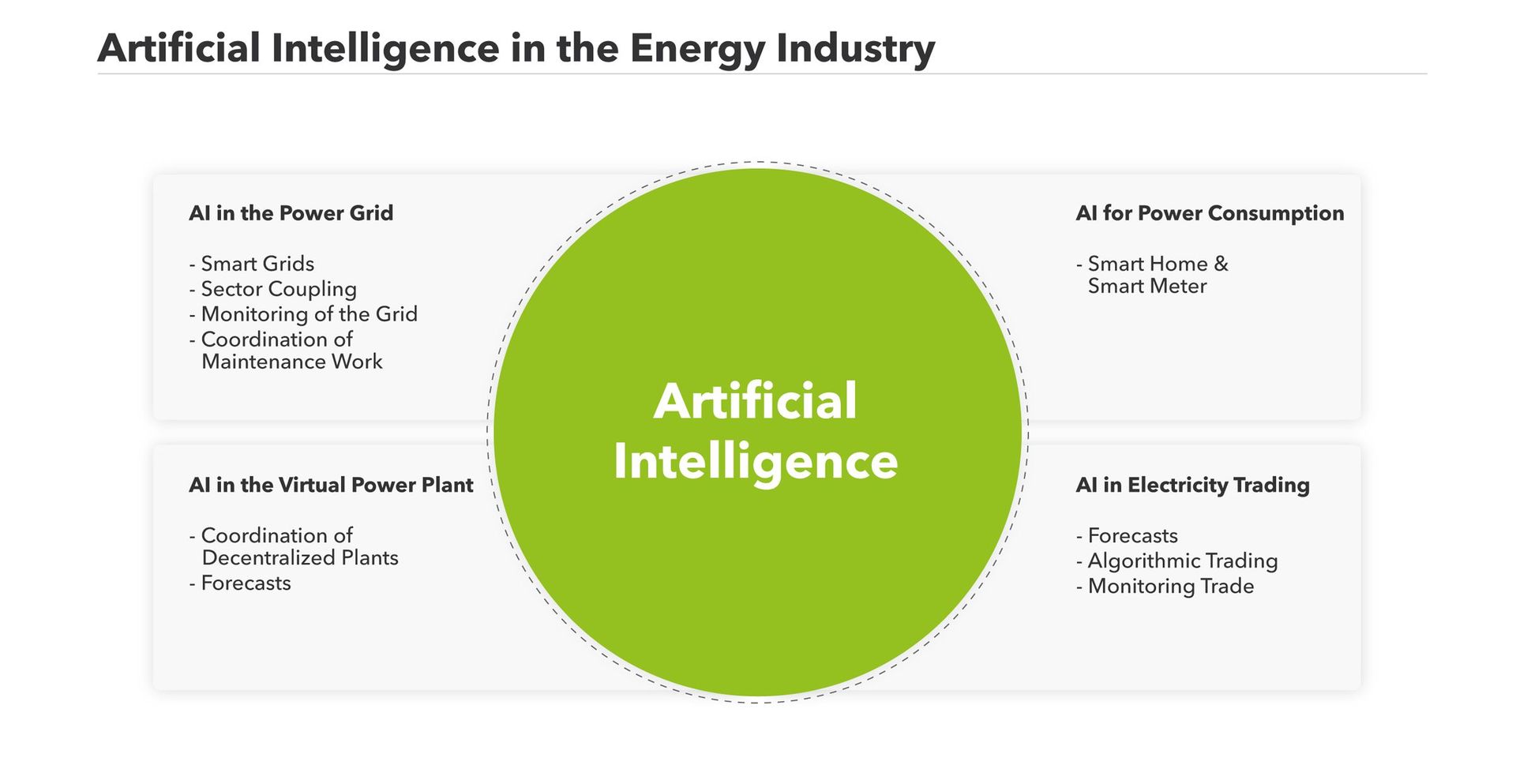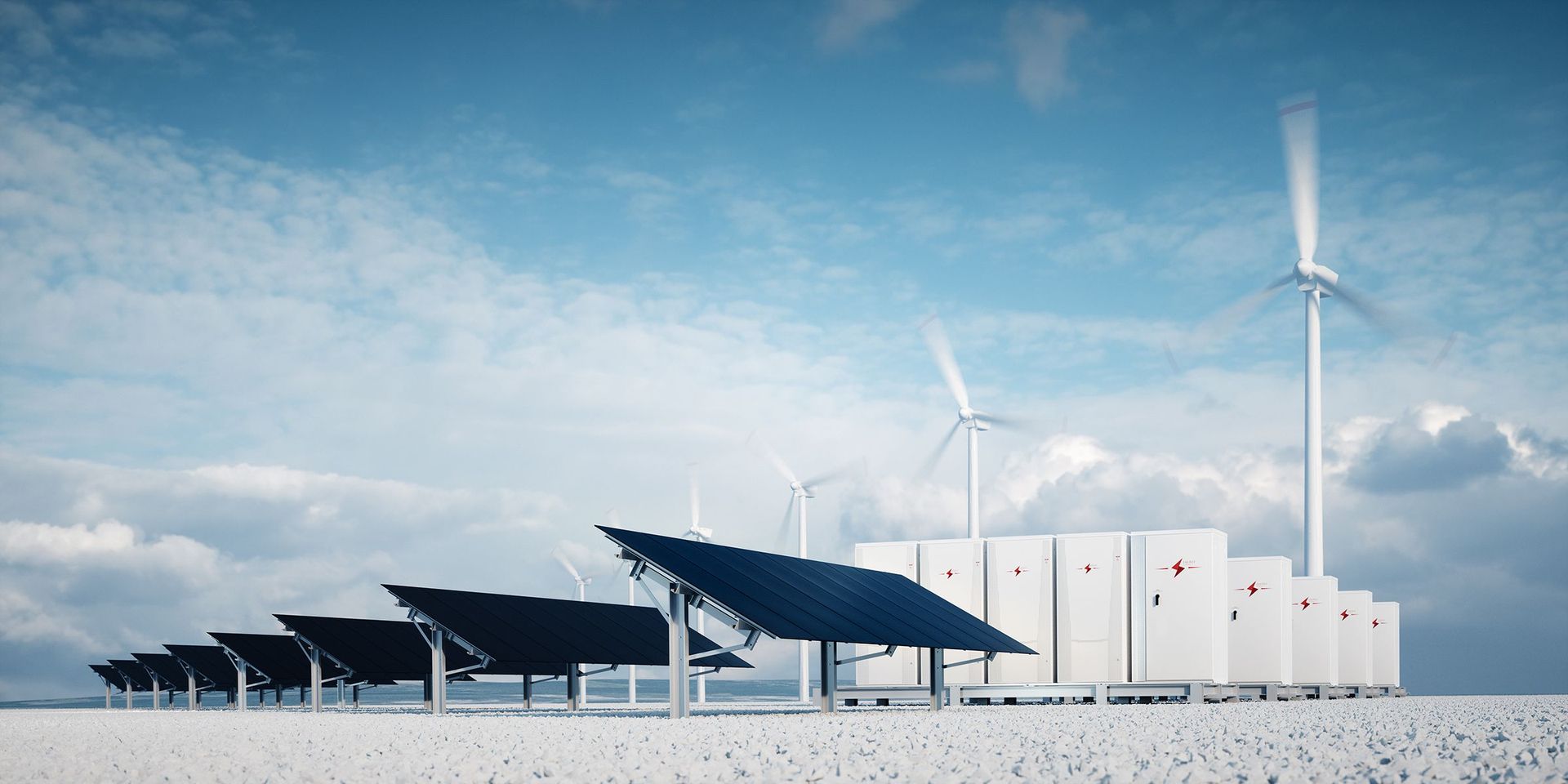What is Artificial Intelligence in the Energy Industry ?
Definition
In recent years, Artificial Intelligence (AI) has gained relevance in a wide variety of sectors. However, defining the term poses some difficulties. Central to Artificial Intelligence is that it makes and implements decisions based on data (information) independently with regard to the set goals. The term artificial distinguishes AI from the "natural intelligence" attributed to humans and animals. Narrower definitions see AI as a branch of computer science that deals with machine learning and the automation of intelligent behavior. Still, the definition of intelligence remains vague and excludes other areas of research, such as robotics or linguistics.
Table of Contents
- Artificial Intelligence: the Attempt at Differentiating
- Machine Learning
- Artificial Intelligence (AI) in the Energy Industry
- Artificial Intelligence in the Power Grid - Smart Grids and Sector Coupling
- Artificial Intelligence in Electricity Trading
- Artificial Intelligence in the Virtual Power Plant
- AI for Power Consumption
- Artificial Intelligence in the Energy Industry - Obstacles and Criticism
Artificial Intelligence: the Attempt at Differentiating
Artificial Intelligence is on everyone's lips right now. It is the fastest growing branch of the high-tech industry. The German government sees AI as a key strategy for mastering some of the greatest challenges of our time, such as climate change and pollution.
It is difficult to establish a clear differentiation of Artificial Intelligence or even a precise definition. AI is often used in connection or sometimes even synonymous with the terms machine learning, big data, or deep learning. These inaccuracies are not least due to the concept of intelligence, which eludes a clear and unambiguous definition.
Artificial Intelligence is clearly distinguished from "natural intelligence" which is attributed to humans and animals. Artificial Intelligence is the intelligence of, for example, machines, algorithms, programs, applications, or systems. These can collect data, process it, and produce results.
But what is intelligence exactly? Various fields of research have already attempted to define intelligence - and have come to different conclusions. A central aspect of intelligence in AI is that it makes decisions based on information and carries out actions with regard to its goals. Under certain circumstances, this includes collecting this information and reacting flexibly to changes and the environment. In other words, this means that the AI learns from experience and makes new decisions independently .
Even with this definition, the term remains difficult to grasp. In practice, therefore, it is common to speak of strong or weak AI. A strong AI is one in which the application has all aspects associated with human intelligence, such as the ability to draw logical conclusions, the existence of general knowledge, the ability to learn to perceive and understand language, to plan and foresee, to move and manipulate objects, and to recognize emotions.
Another common definition of AI is that Artificial Intelligence is a subdiscipline of computer science that aims at enabling machines to perform tasks intelligently. Although computer science is very important in AI, Artificial Intelligence is applicable to other fields, such as statistics, robotics, linguistics, or philosophy.
There is still a discussion about what is already considered AI and what is still the computing power of machines. The transitions are fluid, not least because of the definitional inaccuracies.
Machine Learning
The term Machine Learning (ML) is often used in connection with AI and is of great importance in the energy industry. However, ML and AI are not the same, since Machine Learning includes a part, but not all of the AI. Machine Learning means that machines can learn independently, i.e. draw conclusions for the future from their experiences and solve problems that have not been there before.
Artificial Intelligence (AI) in the Energy Industry
Artificial Intelligence becomes more and more important in the energy industry and is having great potential for the future design of the energy system. Typical areas of application are electricity trading, smart grids, or the sector coupling of electricity, heat and transport. Prerequisites for an increased use of AI in the energy system are the digitalization of the energy sector and a correspondingly large set of data that is evaluable. AI helps make the energy industry more efficient and secure by analyzing and evaluating the data volumes.
Artificial Intelligence in the Power Grid - Smart Grids and Sector Coupling
In particular, AI is present in the field of intelligent networking of electricity consumers and generators across sector boundaries. With the increasing decentralization and digitalization of the power grid, it is becoming more difficult to manage the large number of grid participants and keep the grid in balance. This requires evaluating and analyzing a flood of data. Artificial Intelligence helps process this data as quickly and efficiently as possible.
Smart grids are another area of application. These networks transport not only electricity but also data. Especially with an increasing number of volatile power generation plants such as solar and wind, it is becoming more and more important for power generation to react intelligently to consumption (and vice versa). AI can help evaluate, analyze, and control the data of the various participants (consumers, producers, storage facilities) connected to each other via the grid.
A particular focus of AI in the energy industry is on the integration of electro mobility. An increase in e-cars offers opportunities and challenges. The charging of electric cars must be coordinated, but at the same time, they offer the possibility of storing electricity and stabilizing the grid, for example by adjusting the charging demand to price signals and availability. AI can help with all this by monitoring and coordinating.
In addition, the AI can stabilize the power grid by, for example, detecting anomalies in generation, consumption, or transmission in near real time, and then develop suitable solutions. Initial research projects in this field, such as at the Fraunhofer Institute, are already underway.
Further, AI can help coordinate maintenance work and determine optimal times for the maintenance of networks or individual systems. This helps minimize costs and loss of profit as well as disturbances of the network operation.
Artificial Intelligence in Electricity Trading
Artificial Intelligence in power trading helps improve forecasts. With AI, it is simpler to evaluate systematically the large amount of data in electricity trading, such as weather data or historical data. Better forecasts also increase grid stability and thus supply security. Especially in the field of forecasts, AI can help facilitate and speed up the integration of renewables . Machine Learning and Neural Networks play an important role in improving forecasts in the energy industry.
Developments in forecasting quality in recent years have shown the potential of AI in this area: There is already a reduction in the demand for control reserve, even though the share of volatile power generators in the market has increased.
More exciting articles
Artificial Intelligence in the Virtual Power Plant
Numerous data is processed and forecasts are made in the Virtual Power Plant. The AI algorithms help generate increasingly accurate forecasts as well as coordinate various participants in the Virtual Power Plant.
This happens, for example, when it is necessary to coordinate which plant generates or consumes how much electricity and when. The basis of the analyses are, among other data, live feed-in data, historical data, data from electricity trading centers, and weather forecasts.
Some AI algorithms are already sufficiently intelligent that they can trade on their own. This is what they call algorithmic trading, algo trading, or automated trading.
AI can also help to automatically monitor and analyze trading on the electricity market. This makes it possible to detect and prevent deviations from the norm, such as the abuse of market power, more quickly and specifically.
AI for Power Consumption
Consumers, intelligently connected in the electricity system, can contribute to a stable and green electricity grid. Smart home solutions and smart meters already exist, but they are not yet widely used.
In a smart networked home, the networked devices react to prices on the electricity market and adapt to household usage patterns in order to save electricity and reduce costs. One example is smart networked air conditioning systems. They react to prices on the electricity market by boosting their output when electricity is abundant and cheap. By analyzing user data, they can also include information about user preferences and time windows in their calculations.

Artificial Intelligence in the Energy Industry - Obstacles and Criticism
Any Artificial Intelligence is only as smart as its data. This is one of the biggest sticking points. The topics of data protection and data security are some of the greatest weak points for the use of Artificial Intelligence.
Those who are connected digitally and intelligently reveal a lot about themselves and the system becomes vulnerable to cyberattacks. In 2018, the German Federal Office for Security (BSI) observed that the number of cyberattacks on critical infrastructure tripled in comparison to the previous year.
Energy supply and the entire energy system are part of this critical infrastructure. This is why cybersecurity is becoming more and more important today and in the future in order to protect the highly networked power grid from attacks and data theft from the outside. There are already strict security requirements for participants in the electricity market in the area of data protection and data security, though.
Contrary to the widespread opinion that AI makes the power grid less secure, AI can make an important contribution in the fight against cyberattacks. It can quickly check large amounts of data and thus detect deviations. AI can also draw conclusions from past cyberattacks. Machine Learning has already achieved great success in this area, for example in the detection and defense of Trojans.
Many end users are critical of Artificial Intelligence, especially in relation to smart home technologies. This is understandable, because the data of the most private space that reveals a lot about its users is collected. Studies have shown that the biggest obstacle to the acceptance of smart meters is fear of revealing private information without knowing exactly how it is used. These fears are justified, as there is still no regulation on how to handle this sensitive data, which is important for the electricity system of the future.
Germany and the EU are trying to curb data access by private companies, as is happening in the USA and China, for example. The EU Commission has therefore developed four basic ethical principles for AIs: AI should respect human autonomy, avoid social harm, be fair, and be explainable. You can read these guidelines here. Especially the aspect of explainability will become more and more difficult with stronger and self-developing AIs.
In order to give the energy industry and in particular end consumers more confidence in the AI, it must be clearly communicated how the data is used and by whom, and data security must be guaranteed.
Another criticism of AI is the power consumption of Artificial Intelligence itself. The processing of large amounts of data consumes a lot of electricity. When using AI for energy system transformation, it is crucial to analyze as well how to design the data centers themselves to be energy-efficient and as climate-neutral as possible. Possible solutions to this dilemma include the physical proximity of data centers and renewable energy generation plants, the postponement of power-intensive computing operations to times when a lot of power is available, more energy-efficient IT hardware, or programming that requires as little computing power as possible.
In the energy industry, AI offers a multitude of suitable application scenarios that will support the energy transition and a climate-friendly energy system. It will be crucial, however, to protect user data and make the use of AI transparent and comprehensible.
Disclaimer: Next Kraftwerke does not take any responsibility for the completeness, accuracy and actuality of the information provided. This article is for information purposes only and does not replace individual legal advice.


